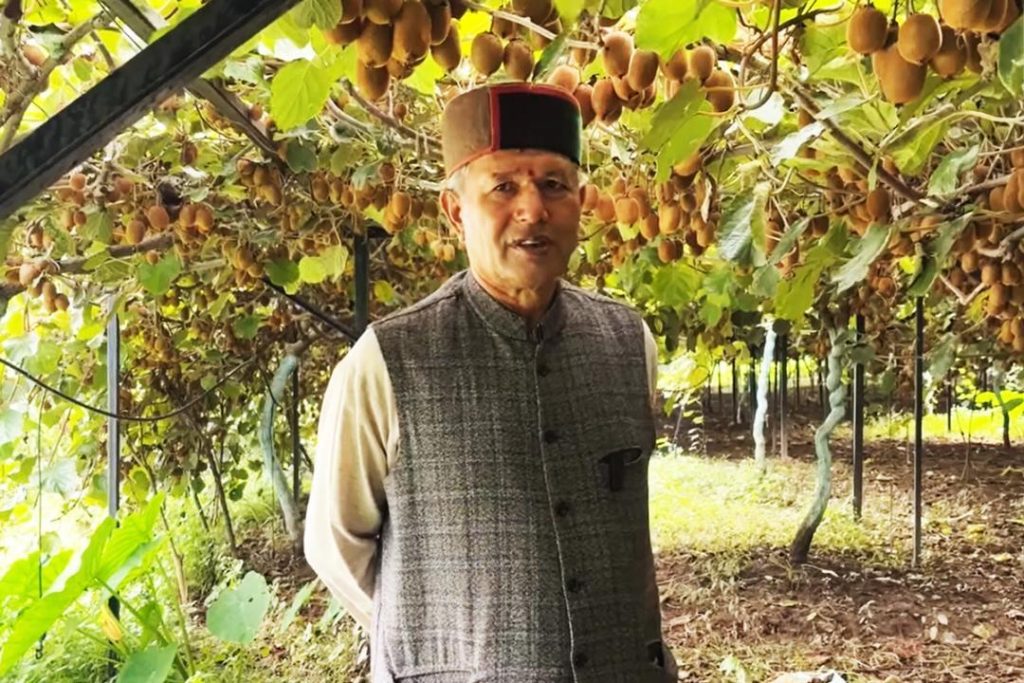
Solan Farmer Earning ₹21 Lakh/acre with Organic Kiwi Farming: A Game-Changer in the Industry
The Indian agricultural sector has been witnessing a significant shift towards organic farming in recent years. With the growing awareness about the importance of sustainable agriculture, farmers are increasingly adopting organic methods to produce high-quality crops. One such remarkable example is Pratap Bharnal, a Solan farmer who has been earning a whopping ₹21 lakh per acre by growing organic kiwis.
Bharnal, a resident of Solan, Himachal Pradesh, began organic kiwi farming in 2017 to diversify away from apples, which were facing declining rates. He started with a small plot of 100 kiwi saplings and has since expanded his farm to 400 kiwi plants. The farm, which is situated at an altitude of 1,500 meters above sea level, has become a model for sustainable and profitable farming in the region.
The secret to Bharnal’s success lies in his innovative approach to farming. He uses only natural methods to fertilize and irrigate his kiwi plants, relying on cow dung manure and water to promote healthy growth. This not only reduces his costs but also ensures that the kiwis are free from chemical residues, making them highly sought after by consumers.
Bharnal’s farm is a testament to the potential of organic kiwi farming. Last season, he harvested an impressive 21,600 kg of kiwis, earning him a staggering ₹21 lakh per acre. This is a remarkable achievement, considering that the average yield of kiwis in the region is around 10-12 kg per plant.
So, what sets Bharnal’s farm apart from others in the region? For starters, his use of natural methods to control pests and diseases has eliminated the need for chemical pesticides and fungicides. This not only saves him money but also ensures that his kiwis are free from chemical residues, making them more appealing to consumers.
Another key factor contributing to Bharnal’s success is his focus on soil health. He uses cow dung manure to fertilize his kiwi plants, which not only adds nutrients to the soil but also helps to improve its structure and water-holding capacity. This, in turn, enables his plants to thrive in the challenging soil conditions of the region.
Bharnal’s farm is also a demonstration of the importance of crop rotation in sustainable agriculture. He rotates his kiwi plants with other crops, such as potatoes and peas, to maintain soil fertility and reduce the risk of pests and diseases. This approach not only enhances the overall productivity of his farm but also helps to reduce his dependence on external inputs.
In addition to his innovative farming methods, Bharnal’s success can also be attributed to his strong marketing skills. He has established a strong network of customers who are willing to pay a premium for his organic kiwis. He has also been able to tap into the growing demand for organic produce in the region, which has helped him to increase his profits.
Bharnal’s story is a testament to the potential of organic kiwi farming in the region. With the right approach and a willingness to innovate, farmers can not only achieve high yields but also earn significant profits. His success is a reminder that sustainable agriculture is not only good for the environment but also good business.
In conclusion, Pratap Bharnal’s story is a shining example of the potential of organic kiwi farming in the region. His innovative approach to farming, focus on soil health, and strong marketing skills have enabled him to earn a staggering ₹21 lakh per acre. As the demand for organic produce continues to grow, farmers like Bharnal are well-positioned to reap the benefits.






